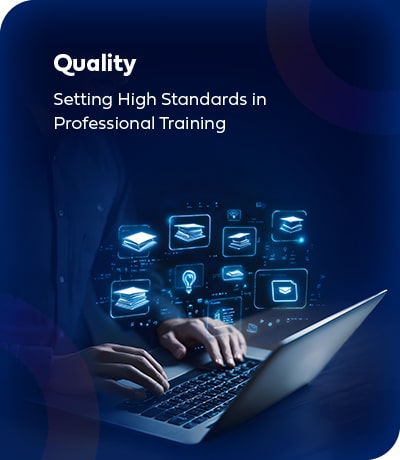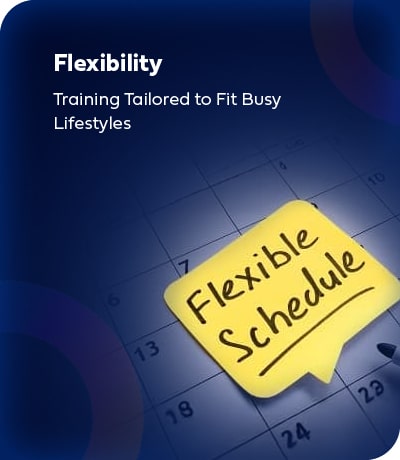
4.8 out of 5 based on 14,693 reviews

Online Course with Exam
Start learning immediately
1,677 Students enrolled
Price Match
Guarantee

3 months instalments of: £216.67
6 months instalments of: £108.33
9 months instalments of: £72.22
12 months instalments of: £54.17

By submitting this form, you agree to e-Careers processing your data in line with our Privacy Policy
If you want to become a successful Bookkeeper in the finance sector, this course is for you. Our Level 2 ICB Certificate in Bookkeeping empowers aspiring certified bookkeepers with the necessary skills to kickstart your professional bookkeeping journey. This qualification is suitable for all, with no formal entry requirements, so if you want to develop core skills and build a bookkeeping career, this ICB online course is for you!
ICB Level 2 Certificate in Bookkeeping trains you with basic accounting concepts and in-demand bookkeeping skills that employers and businesses seek. Achieving this qualification increases your credibility and helps enhance your employability, as employers and clients will be more confident in your skills and capabilities.
Level 2 ICB Certificate in Bookkeeping is accredited by one of the most prominent institutes for bookkeepers, The Institute for Certified Bookkeepers (ICB). Upon completing the qualification, you can upgrade your membership to Associate Member of the Institute of Certified Bookkeepers and use the designatory letters AICB in your bookkeeping profession.
The qualification prepares you for job role opportunities such as Assistant Bookkeeper, Accounts Assistant, Data Entry Clerk, Accounts Payable and Receivable Clerk, and Junior Bookkeeper.
Our online ICB Level 2 Certificate in Bookkeeping offers you the following:
Access to industry-leading eLearning platform.
ICB-approved training course materials.
Support from award-winning, industry-expert Tutors.
Free Sage Software and Xero Accounting Software
Sage Certificate
ICB exams included in the course fee
Mock exam papers
A collection of digital resources.
Interactive course content.
Interest-free payment options.
Best price guaranteed on like-for-like bookkeeping courses.
Support from a training provider that has trained over 630,000 students.
Already completed the Level 2 ICB Bookkeeping course? We also offer the ICB Level 3 Bookkeeping course to help you level up your professional recognition in bookkeeping.
The syllabus centres around the three assessments you must take before receiving your Level 2 ICB Certificate in Bookkeeping. Based on the course's five key topics, each assessment will test your bookkeeping knowledge and skills. These topics include:
Underpinning knowledge
Prepare business documents
Accounting for VAT
Entering transactions
Reconciliation and reporting
On average, the Level 2 ICB course can be completed within 6 to 12 months. We provide you with 12 months of access to the course so you can study the qualification at your own pace.
Format
The ICB Level 2 Certificate consists of three online assessments: A1, A2, and A3. The exams should be taken in numerical order, starting at A3.
A1 and A2 assess your knowledge of the double-entry bookkeeping system, while A3 assesses your bookkeeping knowledge in a computerised system. We'll provide the materials and resources needed to help prepare for your exams. (See Additional Benefits tab)
Upon completing the three assessments, you'll receive the Level 2 ICB Certificate in Bookkeeping and can upgrade your member status to ICB's associate membership. You'll then receive the designatory letters, AICB, for your bookkeeping profession.
A1 – Basic double-entry bookkeeping to trial balance
A1 covers and assesses aspiring bookkeepers with the fundamental concepts of double-entry bookkeeping and guides you through creating a trial balance. Some of the basic principles involved are:
Underpinning knowledge including:
Knowledge of the legal differences between the business types that exist
Terms in bookkeeping (assets, liabilities, etc.)
Banking procedures and security
Understanding the different categories of VAT (standard, reduced, zero, exempt, outside the scope)
Understanding the format of the accounting equation
Understanding the different categories of discounts (trade, bulk, prompt payment, etc.)
Understand the difference between financial and management accounts
Understand the concept of reporting on a cash basis for income tax purposes
Calculation of the value of the capital investment for a sole trader
Performing opening entries in the journal
Creation of business documents, including how to calculate and correctly account for VAT
Understanding the effect of entering transactions into a bookkeeping system for sales, purchases, overheads, capital items, returns, personal items, etc.
Recording the effect of making and receiving payments, including bank, cash and petty cash transactions
Calculation of relevant account balances
Production and explanation of a trial balance
A2 – Further double-entry bookkeeping to trial balance
A2 assesses your understanding of the advanced concepts in double-entry bookkeeping, recording financial transactions and preparing a trial balance. The key concepts that A2 will assess you are:
Underpinning knowledge including:
Professional Ethics
Legislation relevant to the bookkeeper
Accounting concepts
Further double entry includes the following:
Topics from A1 papers
The content of control accounts
Understanding and posting discounts allowed/received
Writing off a bad debt
Construction Industry Scheme (CIS)
Posting non-sole trader entries (subscriptions, donations, drawings of partners, directors’ loan accounts, etc.)
Performing journal entries (payroll journal calculation, bad debt expense, etc.)
Calculation of the value of a suspense account in a system that does not balance
Reconciliation of debtors, creditors and bank balances
Understanding the treatment of imports and exports
Correction of errors that do not affect the trial balance
Production and explanation of a trial balance
A3 – Data entry to trial balance using software
A3 assesses your bookkeeping knowledge and skills in accounting software that you would need in today's modern bookkeeping world. Here, the assessment will test how you efficiently record transactions and generate trial balances using accounting software programmes. Some of the key concepts you'll learn to apply in accounting software are:
Opening of entries
Entry of cash and credit transactions
Production of a trial balance
Production of reports for debtors, creditors, banks, VAT and the audit trail
Bank reconciliations
Correction of errors
Duration
Once you've started an exam, you must complete it within the exam duration. Remember to complete and submit your exam within 14 days of booking to avoid the assessment becoming void. Here are the duration for each exam at this level:
A1 – Basic double-entry bookkeeping to trial balance: 2 hours
A2 – Further double-entry bookkeeping to trial balance: 2 hours
A3 – Data entry to trial balance using software: 24 hours
Availability
All three assessments are available on-demand, so you can book an exam once you've completed all the course materials for a particular assessment. We'll assist you with the process and additional instructions for booking and registering for an exam.
You'll need an active student registration or membership to take your exams online. While we provide the exams in the course, annual student registration is separate from the course price.
If you want to earn a living through bookkeeping, this course is for you. The Level 2 ICB Certificate in Bookkeeping is available to individuals from various industries and educational backgrounds.
This Level 2 Certificate in Bookkeeping has no formal entry requirements and is beginner-friendly for those who want to start a bookkeeping career or change careers. Completing this bookkeeping course can help you land a position in finance.
To study the ICB Level 2 Certificate in Bookkeeping, we recommend that you:
Are at least 16 years old (or have the consent of a parent or guardian).
Have a solid understanding of the English language.
Have basic numerical skills.
Have access to a PC or laptop (This course is compatible with both Mac and Windows).
Have access to a secure internet connection.
Most comprehensive course training at the most affordable price.
ICB designation: Receive your AICB designation awarded by the Institute of Certified Bookkeepers after you complete this level.
Comprehensive eLearning platform: Access an industry-leading eLearning platform that contains all the support and learning materials you need and has a user-friendly interface for easy navigation.
Responsive tutor support: Request unlimited support from award-winning tutors who aim to assist you with your learning and respond to you within 24-48 hours.
Interactive course content: Our interactive course content, consisting of engaging slides, videos, animations, and more, can help you engage with the lessons better. It can be found on our eLearning platform.
Fully accredited ICB courseware: Gain additional learning insights as we provide ICB-accredited learning resources, including pocket revision kits, practice papers, question banks, and exam preparation guides.
Flexible learning: Study independently as you can access the course in our eLearning platform for 12 months.
Free Accounting Software: Learn computerised bookkeeping practices as we provide you with free accounting software such as Sage and Xero Accounting during your study of our course.
Sage Certificate included: Enhance your professional credibility and earn your Sage certification as an addition to your professional toolkit.
Mock exam papers: Our mock exam papers help you simulate and get a feel for the actual examinations, helping you prepare for your ICB exams.
Interest-free payment options: Our payment options make your education more accessible so you can study the course and start your learning journey without worries.
Available ICB courses: Continue learning with our ICB Level 3 Certificate in Bookkeeping and Accounts.
TOTUM Pro Card: Shop with discounts using TOTUM Pro Card, which offers discounts in selected stores and websites.
Is ICB a recognised qualification?
Yes, ICB qualifications are recognised worldwide. The Institute of Certified Bookkeepers is one of the most prominent awarding bodies for the bookkeeping profession, with students and members in 100 countries. ICB maintains a global presence and is recognised by employers worldwide and industry professional bodies like ACCA and CIMA.
How do I get ICB certified?
To get ICB Certified, you must choose the ICB qualification you want to study and register as a student. Complete the course materials and take the corresponding exams in the specified order. Upon completion, you will receive the certification and the option to upgrade to associate membership level in the ICB.
What is ICB Level 2?
The ICB Level 2 Certificate in Bookkeeping is an introductory qualification offered by the Institute of Certified Bookkeepers, the world's largest bookkeeping institute. It equips individuals with the basic principles and practical skills to perform basic bookkeeping tasks. In this course, you will accurately prepare business documents, enter transactions, correct errors, prepare an initial trial balance, and more.
How long does ICB Level 2 take?
At e-Careers, we offer flexibility on the course to allow our students to study at their own pace. On average, our students typically complete their ICB Level 2 Bookkeeping course within 6 to 12 months.
What should I do next after I have completed the ICB Level 2 Certificate?
Upon completing the Level 2 ICB Certificate, you'll gain the designatory letters, AICB, which you can use in your professional employment or bookkeeping business. You're also eligible to take the ICB Level 3 Certificate, where you can further develop your bookkeeping skills and knowledge to a more advanced level.
What jobs can I apply for after my ICB Level 2 Certificate?
Upon completing the Level 2 Certificate, you'll gain the designatory letters AICB. You can then apply for job roles related to bookkeeping and finance. Some of these positions include:
Accounting Clerk
Accounting Clerks work for large companies, handling prime entry books and maintaining records for a single account. Their average salary in the UK is £23,000.
Accounts Administrator
An Accounts Administrator handles data-entry tasks such as processing invoices, managing financial records, and supporting the finance team with day-to-day accounting duties. The average salary for this role is around £23,000.
Purchase & Sales Ledger Clerk
A Purchase and Sales Ledger Clerk records financial transactions, processes payments, and manages payable and receivable accounts. The yearly salary for this position is £23,000.
Accounts Payable Clerk
An accounts payable clerk is an essential part of a company's financial team. They are responsible for managing the money the company owes to its vendors and suppliers. Their annual salary in the UK is £24,000.







